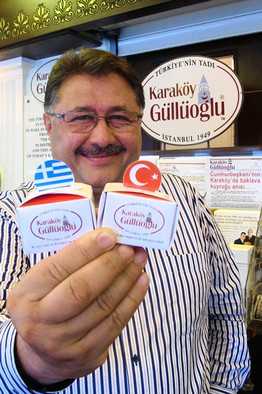By JOE PARKINSON And AYLA ALBAYRAK
ISTANBUL—Europe’s multibillion-euro bailout of Greece has been making headlines on a daily basis. Less noticed was a Turkish bailout last week of an Athens institution: sweet seller Baklavas Epe.

Greeks and Turks have bickered for centuries over which nation makes the better baklava, a sticky-sweet dessert of layered pastry devoured in huge quantities across the eastern Mediterranean and the Middle East. But for the past 10 years, Turkey’s best-known producer, businessman Nadir Gullu, has been supplying Greece’s closely held Baklavas Epe, which operated five stores in Athens. He provided about two tons of baklava and other Turkish sweets per month.
Old rivalries aside, Athenians lapped them up—until, that is, they ran out of cash.
Baklavas Epe’s most profitable shop is on Athens’s landmark Syntagma Square. Before the crisis, tourists and locals queued up in droves to buy the pastries. But as the government embarked on a severe austerity program to reduce its debt burden and qualify for international support, demand sank.
Baklavas Epe closed three of its five stores in Athens as sales dropped. Meanwhile, it ratcheted up close to €160,000 (about $226,000) in debt for deliveries of sweets from across the Aegean Sea, according to the company. Plunging revenue made it impossible for Baklavas Epe to finance baklava purchases from Istanbul.
“Baklava has become a luxury. Think about it: Three kilos of minced beef costs the same as one kilo of baklava,” said a company spokesman. (A kilogram is about 2.2 pounds.)
In Turkish newspapers, Mr. Gullu, the owner of Karakoy Gulluoglu, a well-known baklava shop near the shores of the Bosporus in Istanbul, said the Greeks should pay their debts within a year and the business relationship was in jeopardy.
With elevated wage costs and sporadic vandalism amid protests over austerity measures adding to its woes, Baklavas Epe said it needed more time. Besides, it said, Mr. Gullu in public comments had exaggerated the amount of the debt. In short, it didn’t look good for business and friendship in the Greek-Turkish baklava trade.
[BAKLAVA]
But after the partners met last week to discuss a possible resolution, they reported a deal that would preserve and even expand their business ties. Under terms of the deal, Karakoy Gulluoglu will continue to supply Baklavas Epe and extend its loan financing for three more years. The firms will also embark on a new joint-venture coffee shop in Athens, which is scheduled to open in September.
The thinking is that if Athenians can’t afford to buy a kilo of baklava to take home anymore, maybe they can afford a few pieces to have with a coffee, the Baklavas Epe spokesman said.
Mr. Gullu says his own business, which has expanded dramatically in recent years to sell baklava and Turkish sweets in 85 countries, including the U.S., is in a position to extend the loans. “I told them, ‘it’s OK, keep paying slowly,’ ” Mr. Gullu said in an interview. “We are doing this for our friendship and for Turkish moral pride.”
The Baklavas Epe spokesman said both companies remained positive about their relationship and about the potential for the Greek economy to bounce back. “I don’t believe that Greece will stay like this because Greeks love life,” he said.
Mr. Gullu’s decision to extend his partner’s credit line is indicative of an improvement in relations between Greece and Turkey, particularly in the business community, since a pair of earthquakes drew them together in 1999. Turkish-Greek trade increased steadily until it reached around $3.6 billion in 2008, falling back to $3 billion last year amid the global economic slowdown, according to figures from the Turkish statistics agency Turkstat.
Mr. Gullu says Turks are no strangers to the pains of austerity, having negotiated their most recent International Monetary Fund bailout package in 2002 after a banking crisis the year before roiled the economy. Turkish businesses could use cash flow from their country’s booming economy to invest in Greece if it makes business sense, he added.
“We’ve suffered economic crises here in Turkey before so we understand the problems Greeks are going through….We will find a solution to this sticky situation,” he said.
via Baklava Bailout: How Turkey Helped Greece’s Sweet Tooth – WSJ.com.

Leave a Reply